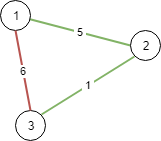Welcome to Subscribe On Youtube
1135. Connecting Cities With Minimum Cost
Description
There are n cities labeled from 1 to n. You are given the integer n and an array connections where connections[i] = [xi, yi, costi] indicates that the cost of connecting city xi and city yi (bidirectional connection) is costi.
Return the minimum cost to connect all the n cities such that there is at least one path between each pair of cities. If it is impossible to connect all the n cities, return -1,
The cost is the sum of the connections' costs used.
Example 1:

Input: n = 3, connections = [[1,2,5],[1,3,6],[2,3,1]] Output: 6 Explanation: Choosing any 2 edges will connect all cities so we choose the minimum 2.
Example 2:

Input: n = 4, connections = [[1,2,3],[3,4,4]] Output: -1 Explanation: There is no way to connect all cities even if all edges are used.
Constraints:
1 <= n <= 1041 <= connections.length <= 104connections[i].length == 31 <= xi, yi <= nxi != yi0 <= costi <= 105
Solutions
Solution 1: Kruskal’s Algorithm
Kruskal’s algorithm is a greedy algorithm used to compute the minimum spanning tree.
The basic idea of Kruskal’s algorithm is to select the smallest edge from the edge set each time.
- If the two vertices connected by this edge are not in the same connected component, then add this edge to the minimum spanning tree,
- otherwise discard this edge.
For this problem, we can sort the edges in ascending order of connection cost, use a union-find set to maintain connected components, select the smallest edge each time, and
- if the two vertices connected by this edge are not in the same connected component, then merge these two vertices and accumulate the connection cost.
- If a situation occurs where the number of connected components is $1$, it means that all vertices are connected, and we return the accumulated connection cost, otherwise, we return $-1$.
The time complexity is $O(m \times \log m)$, and the space complexity is $O(n)$. Here, $m$ and $n$ are the number of edges and vertices, respectively.
-
class Solution { private int[] p; public int minimumCost(int n, int[][] connections) { Arrays.sort(connections, Comparator.comparingInt(a -> a[2])); p = new int[n]; for (int i = 0; i < n; ++i) { p[i] = i; } int ans = 0; for (int[] e : connections) { int x = e[0] - 1, y = e[1] - 1, cost = e[2]; if (find(x) == find(y)) { continue; } p[find(x)] = find(y); ans += cost; if (--n == 1) { return ans; } } return -1; } private int find(int x) { if (p[x] != x) { p[x] = find(p[x]); } return p[x]; } } -
class Solution { public: int minimumCost(int n, vector<vector<int>>& connections) { vector<int> p(n); iota(p.begin(), p.end(), 0); sort(connections.begin(), connections.end(), [](auto& a, auto& b) { return a[2] < b[2]; }); int ans = 0; function<int(int)> find = [&](int x) -> int { if (p[x] != x) { p[x] = find(p[x]); } return p[x]; }; for (auto& e : connections) { int x = e[0] - 1, y = e[1] - 1, cost = e[2]; if (find(x) == find(y)) { continue; } p[find(x)] = find(y); ans += cost; if (--n == 1) { return ans; } } return -1; } }; -
class Solution: def minimumCost(self, n: int, connections: List[List[int]]) -> int: def find(x): if p[x] != x: p[x] = find(p[x]) return p[x] connections.sort(key=lambda x: x[2]) p = list(range(n)) ans = 0 for x, y, cost in connections: x, y = x - 1, y - 1 if find(x) == find(y): continue # already connected with ealier lower cost p[find(x)] = find(y) ans += cost n -= 1 if n == 1: return ans return -1 -
func minimumCost(n int, connections [][]int) (ans int) { p := make([]int, n) for i := range p { p[i] = i } sort.Slice(connections, func(i, j int) bool { return connections[i][2] < connections[j][2] }) var find func(int) int find = func(x int) int { if p[x] != x { p[x] = find(p[x]) } return p[x] } for _, e := range connections { x, y, cost := e[0]-1, e[1]-1, e[2] if find(x) == find(y) { continue } p[find(x)] = find(y) ans += cost n-- if n == 1 { return } } return -1 } -
function minimumCost(n: number, connections: number[][]): number { const p = new Array(n); for (let i = 0; i < n; ++i) { p[i] = i; } const find = (x: number): number => { if (p[x] !== x) { p[x] = find(p[x]); } return p[x]; }; connections.sort((a, b) => a[2] - b[2]); let ans = 0; for (const [x, y, cost] of connections) { if (find(x - 1) == find(y - 1)) { continue; } p[find(x - 1)] = find(y - 1); ans += cost; if (--n == 1) { return ans; } } return -1; }